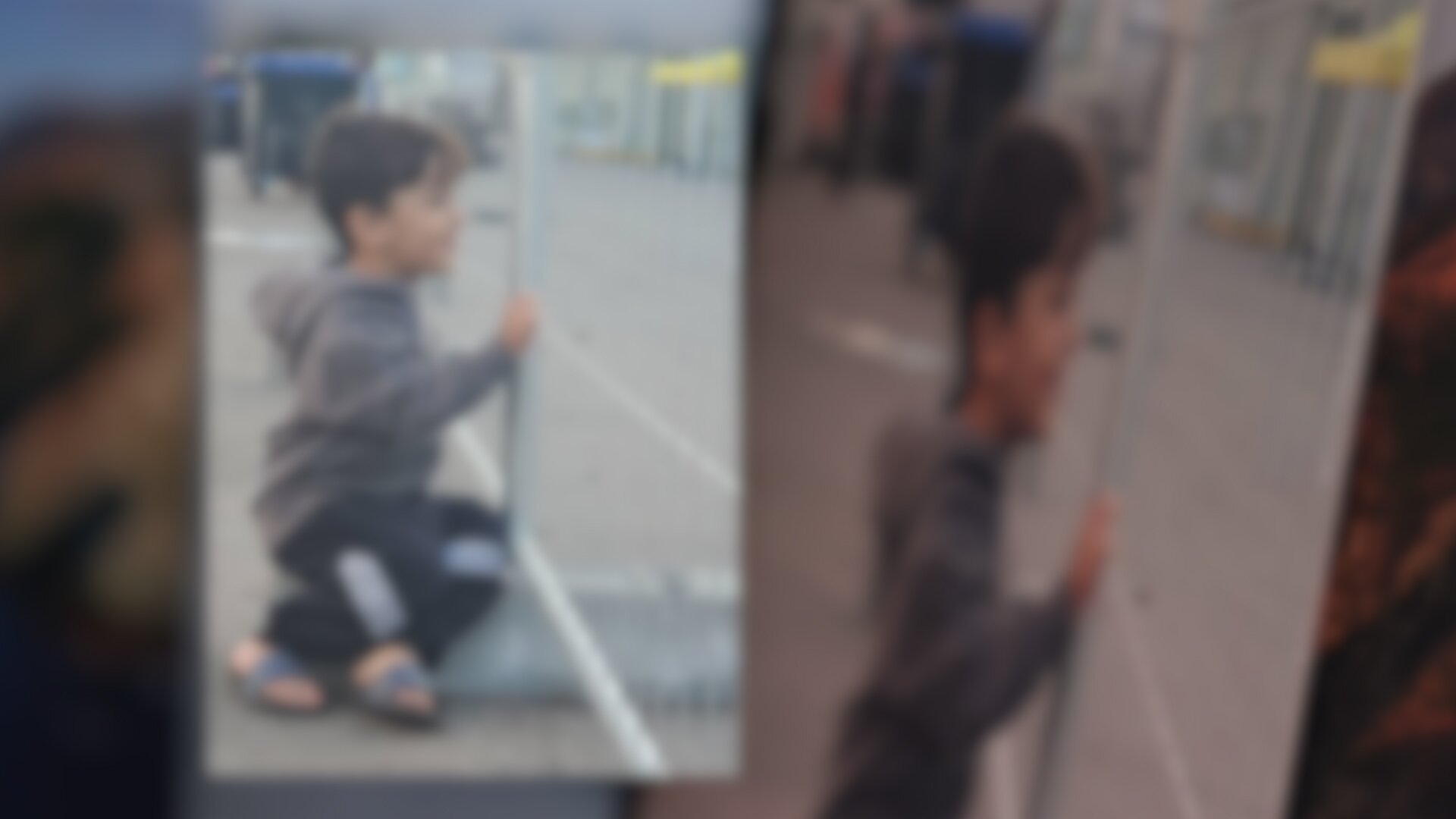Separated during Taliban's takeover, Afghan family reunites in Colorado

AURORA, Colo. — “We are really happy that we came to Colorado. It is really beautiful. Mountains are beautiful, people are nice,” said Aurora resident and soon-to-be U.S. citizen, Masood.
Sitting next to his wife, Masood and his family have quite a story to tell. Rocky Mountain PBS is not using his full name or sharing images of his or his family’s faces because of the fear of Taliban retaliation against Masood’s relatives still living in Afghanistan.
For the first time in their seven-year marriage, Masood, his wife, and their three-year-old son are living together in the United States. They welcomed Rocky Mountain PBS and a resettlement advocate-turned-friend into their Aurora living room to share tea and some of their story.
Masood starts by talking about events from nearly 30 years ago.
“We were against the Taliban since the 90s. They killed my three uncles. They were our enemies,” Masood explained.
He and his family love Afghanistan. They were committed to protecting one another and their country. For Masood, one way to do that in recent decades was working for U.S. military forces as an interpreter.
“It was a good opportunity for us to help our country. The U.S. Army couldn’t speak our language. We were the best way to communicate with the local people,” added Masood.
He worked as an interpreter with the Army, Special Forces and the Navy Seals from 2009 until 2014. That is when the bases where he worked were shut down.
The job paid well. It also helped defend his homeland. His two brothers also became interpreters.
They knew it was dangerous. The young men had taken jobs that would forever put their families at risk.
“It put us in great danger. One time in 2011, they attacked my father. They shot him. They tried to kill him because we were working with the U.S. Army,” he said, recalling how his dad, a doctor, was ambushed by attackers on motorcycles with AK-47 rifles. Masood’s dad survived after he was shot three times in the leg.
Seeking safety in the U.S. was the only option. In 2014, Masood went into hiding and applied for a Special Immigrant Visa (SIV). That same year, he married a young woman from a family that had been friends with his family for decades. Fifteen days after the wedding, his visa was granted, and he moved to Colorado soon after. He was permitted to apply for a I-130 visa for his wife in 2017, a process that can take years to be approved.
“It’s been almost four years that she couldn’t get her visa because of some restrictions, then COVID-19, and then this happened in Afghanistan—the whole government collapsed,” he said.
For years, they lived as a married couple when he would travel to Afghanistan, usually every six months for an extended stay. The rest of the year, Masood worked myriad jobs in the United States, sending money home to Afghanistan to support his new family and that of another uncle who was killed by the Taliban nearly 10 years ago.
“One of my uncles was also killed because of us, so I support his family, too,” Masood explained. “I needed a lot of money, so that’s why I keep changing jobs. I’ve worked in the airport as a ramp agent and fueler, then I became a limousine driver. I worked in construction and then I started driving a truck.”
In August, Masood was one final step (a naturalization ceremony) away from becoming a U.S. citizen. His wife and son’s applications were moving slowly, but they dreamed of starting a life together in Colorado as soon as possible.
The collapse of Afghanistan’s government and the withdrawal of U.S. troops changed everything. It was an international crisis, and it was a most terrifying time for Masood’s loved ones. He had just left them in June, safe and sound. Less than two months later, his family needed to get out, fast.

“We had no idea this was going to happen,” he said, explaining how difficult a time it was for him to be away from his family. Masood said he heard rumors that the Taliban were retaliating against U.S.-allied Afghans like Masood by kidnapping family members.
Private organizations are stepping in to help Americans and their allies who are still stuck
Kandyce Pinckney knows all too well how challenging this is. She once led Denver’s No One Left Behind chapter. Today, she is still committed to doing whatever it takes—at all hours of the day and night—to help Afghan families in need. Families like Masood’s.
Pinckney has known Masood since he arrived in Colorado seven years ago.
“Frankly, we owe it to them. They made a choice to work with us. We made a promise. And there are a very feisty number of private individuals that are working very hard to make sure we meet that promise,” she said.
American citizens continue to guide families to safety with limited resources in an effort some are calling a “Digital Dunkirk” in reference to the World War II event when pleasure boats and private yachts worked together to help rescue British troops trapped in France.
These organizations rely on private funding and countless volunteer hours. Flights to safe cities (in the United Arab Emirates, Qatar, etc.) can cost hundreds of thousands of dollars on chartered airplanes. There are also expenses for safe housing, food, and other transportation expenses.
“I have, personally, on my plate two American citizens and nine green card holders,” Pinckney added, explaining how she helps to navigate visa status, flight options, safe house locations—all from Colorado. She is very clear: many people are still awaiting safe evacuations from Afghanistan.
“It's hundreds of people through all of these various task forces. They have American citizens, green card holders, and their families are still stuck.”
Task Force Pineapple’s effort from U.S. veterans and volunteers to evacuate Afghan allies over the summer gained broad attention. Many more organizations are joining the cause. Pinckney is working closely with Task Force Argo now. There are endless spreadsheets, WhatsApp and Signal text conversations all guided by teams trying to reunite families like Masood’s.

“We're listening to the State Department and the administration say everyone that's still in Afghanistan is choosing to be there. But I have a family where the dad and the husband is a green card holder and his wife and son don't have a visa. So yes, he's choosing to stay, but it's not a real choice, because if he leaves his wife and son, the Taliban will come for them,” explained Pinckney.
Masood’s wife and son leave Afghanistan
In August, Masood had been connecting with Pinckney in hopes of learning something...anything. His wife was scheduled to interview for her I-130 visa at the U.S. Embassy in Kabul. When the Afghan government collapsed and the Taliban rose to power, she was granted a temporary visa as a “gate-pass” of sorts and immediately tried to get to the airport.
“They went there for two days and couldn’t get to the airplane. They were waiting there. There were shootings. My son, he was really scared because it was his first time hearing bullet rounds,” said Masood.
It was the day before the August 26 suicide bomb attack at Hamid Karzai International Airport in Kabul when Masood’s wife, young son, and brother boarded a large military flight out of the country.
“It was a really scary situation. People were stepping on each other. When we finally made it onto the plane, we took a deep breath,” she said through Masood’s interpretation.
They flew to Qatar, then weeks later to Germany, then finally to Virginia for additional immigration processing. After more than two months, they were home, together, in Aurora, Colorado.
“We are very happy. We hope for a better future in Colorado,” Masood’s wife said, a smile evident across her face.
One of Masood’s brothers is now in Texas awaiting visa clearance for his wife and son who are still in Afghanistan. Another brother is planning to resettle in Utah. They are still awaiting safe evacuation from Afghanistan for their parents.
The sprint is now a marathon for families and organizations
With the current Afghanistan story no longer in the daily headlines, donations are declining, but the work is still ongoing. Families are starting to resettle within several American cities, including across Colorado. Masood tells us that many families still in Afghanistan are in hiding, desperate for jobs, and some are facing starvation.
“Please help them because Afghans are in a really bad situation. We have friends who worked in the Afghan government. The Taliban is searching their houses and a lot of people are disappearing in the middle of night,” Masood said, pleading for people to help.
Want to know how you can help from Colorado? Pinckney has a few ideas. Top on the list: be welcoming when new families move into our communities.
“Continue to advocate in whatever way, whether that's financial donations, volunteering, playing soccer with their kids, helping with those bus routes, or with English lessons,” said Pinckney.
More options can be found here.
Masood will become a U.S. citizen in an upcoming naturalization ceremony set to happen within the next month.
Jennifer Castor is the Executive Producer of Multimedia Content at RMPBS. You can email her at jennifercastor@rmpbs.org.
